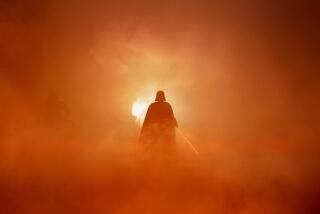Review: Zhang Yimou’s ‘Shadow’ is always beautiful, often obscure
- Share via
Zhang Yimou’s “Shadow” has barely begun before two things become immediately apparent: this is an extravagant and exquisite visual tour de force with a plot that will take some time to sort out.
An unlikely combination of wuxia-style pulp fiction and rarefied cinematic technique with some bloody Grand Guignol moments thrown in, “Shadow” is definitely a film that goes its own way. Which is what you’d expect from director and co-writer Zhang.
A stalwart of China’s celebrated Fifth Generation of filmmakers, Zhang has done martial arts before (“House of Flying Daggers”), as well as personal stories (“Raise the Red Lantern”), political dramas (“Coming Home”), even misguided U.S./China co-productions like the Matt Damon-starring “The Great Wall.”
He’s on firmer ground with the nihilistic “Shadow,” set during the legendary Three Kingdoms period of the 3rd century where warriors were mighty, weapons were deadly, but wounds — no matter how grievous they looked — were not necessarily fatal.
Speaking of looks, as shot by Zhang Xiaoding, “Shadow” is as gorgeous as it is stylized, and it couldn’t be more stylized.
Inspired, the director says, by the ink brush painting techniques of Chinese paintings, Zhang has decreed a film where it rains every day and the color palette is made up almost exclusively of infinite shades of black, white and gray.
The only exceptions are the flesh-colored skin of the participants and the copious bright red blood that spills when the action gets hot and heavy. Which it eventually does.
Reaching that takes awhile. “Shadow’s” script (co-written by Li Wei and director Zhang) takes great delight in obfuscation, throwing you right in the middle of things and introducing characters whose role and purpose is difficult to discern.
Starting at the top, we are dropped in the court of the King of Pei (Zhang Kai), an effete dilettante who oversees, along with his sister Princess Qingping (Guan Xiaotong), a palace rife with betrayal and counter-betrayal.
The real power in this city-state, however, belongs to the Commander (Chinese star Deng Chao), the calm and capable head of the armed forces who has just returned from challenging the formidable Yang (Hu Jun), the military chief of a neighboring city, to a duel.
But, as the film’s title hints, we’re not seeing the real Commander, who’s recovering from a serious wound, but Jing (also played by Chao), a look-alike who has been trained from childhood to take over from the Commander should the need arise.
With the real Commander scheming behind a hidden door deep in the palace, it is Jing who appears in public and displays the strength and skill necessary to fool everyone. (Plausibility is not one of this film’s strengths but no matter.) The only person who knows what’s going on is the Commander’s accomplished wife Madam (Sun Li), a long-suffering woman who is also a deft hand at playing the Chinese zither.
Given the sensitive nature of Jing (who wonders aloud whether he is a man or a ghost) and the surly personality of the real Commander, it’s no surprise that a love-that-dares-not-speak-its-name attraction is evident between Jing and Madam.
All that has to be put aside, however, as the Commander, his shadow and his wife secretly strategize the best way to defeat Yang. The plan they come up with, involving umbrellas made up of steel blades and warriors who embrace their feminine side is nothing if not unexpected.
This may sound straight-forward enough, but it is the business of “Shadow” to keep us puzzled and guessing as long as it can before the inevitable showdown wraps up all this palace intrigue.
Fortunately, both the film’s gorgeous look and its meticulously choreographed action sequences keep us more than occupied until the plot pieces fall into place.
No one should be expecting, however, a completely rational wrap-up. This is, after all, a bleak world where magic salves exist and wounds that would cripple Godzilla can be shrugged off with barely a grimace. “Shadow” offers many things, but documentary realism is obviously not one of them.
------------
‘Shadow’
Not rated
Running time: 1 hour, 53 minutes
Playing: Arclight, Hollywood; Landmark, West Los Angeles
More to Read
Only good movies
Get the Indie Focus newsletter, Mark Olsen's weekly guide to the world of cinema.
You may occasionally receive promotional content from the Los Angeles Times.








